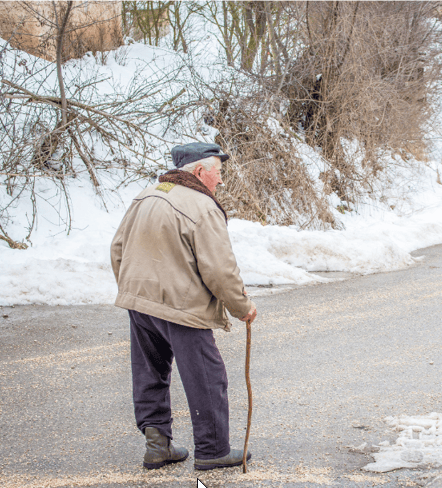Why do cold temperatures affect the elderly so much?
As we age, our bodies naturally become more vulnerable to the effects of cold weather. This is due to a slower metabolic rate, reduced muscle mass, and thinner layers of insulating fat beneath the skin. These make it harder for older people to generate and retain body heat.
Also some health conditions and medications can affect the body’s ability to regulate temperature.
What is the ideal home temperature for elderly people?
The NHS recommends that the main living area for older people be kept at a minimum of 21°C (70°F), with other rooms no lower than 18°C (64°F). Temperatures below this can significantly increase the risk of health complications.
Studies have shown that cold environments can worsen conditions such as arthritis, high blood pressure, and even increase the risk of heart attacks or strokes.
The health risks of cold homes
For elderly individuals, living in a cold home can lead to:
Respiratory illnesses: Such as bronchitis and pneumonia, caused by weakened immunity in cold conditions.
Cardiovascular strain: Cold weather forces the heart to work harder, potentially triggering heart attacks or strokes.
Falls and injuries: As a result of stiffer muscles and joints, making movement more challenging.
Mental health challenges: Including feelings of isolation, anxiety, and depression, which can be exacerbated in a cold, unwelcoming environment.
Medical conditions and cold weather
Older adults are more likely to have certain chronic medical conditions that make it harder to stay warm:
Diabetes can prevent blood from flowing normally to provide warmth.
Thyroid problems can affect the body’s ability to maintain a normal body temperature.
Parkinson’s disease and arthritis can make it challenging to put on more clothes, use a blanket, or get out of the cold.
Memory problems can cause a person to forget to take precautions for staying weather-safe, such as wearing appropriate attire.
Some medications can affect body heat, too. These include prescription medications and those bought over the counter, such as some cold medicines.
What you can do to stay warm indoors?
About 20% of injuries related to exposure to cold occur in the home. By taking some simple precautions the elderly can stay warmer this winter.
1. Eat well
Hot meals and hot drinks will leave you with a warm glow. Consider switching breakfast cereals for a hot bowl of porridge to give you a boost of warmth, or substituting a cold salad for a healthy soup. See some great winter warming recipes below.
2. Dress Warm
Firstly – layer up. Lots of thin layers can be more effective than a few thick items of clothing because each layer traps warm air.. A thin vest and thermal leggings can do more to keep you warm than a heavy knitted jumper.
Secondly – keep your feet warm. People who are at home during the day in winter will know that you can lose a lot of heat through your feet and your head. Use hot water bottles or electric blankets to warm the bed, however never use them together as this can be dangerous.
3. Protect yourself from chilblains
Chilblains are itchy red swellings that happen when your skin gets too cold and you try to warm up too quickly, usually by sitting too close to a radiator. Keep warm to prevent chilblains. If you get a chilblain don’t scratch it as this could cause an infection. They usually heal within a few weeks.
4. Stay Active
Even moderate exercise can bring health benefits and moving around at least once an hour can help your circulation. Try not to sit for more than an hour at a time, even if it is just moving your arms and legs to keep warm.
From about the age of 55, we lose around 1% of our muscle mass every year. Muscle is what keeps us warm.
5. Keeping your house warm
Have your heating system serviced and chimney swept regularly. Check your water stopcock is working properly.
Keep doors and windows closed in cold weather to keep the heat in, use draft excluders to stop cold air flowing through your home. Fit thermal linings to your curtains if you can – this will also help to keep the heat in.
6. Use Microwaveable Heating Pads
Heating pads are fairly inexpensive, and they can make a huge difference when you’re cold. Use a heating pad on your hands and feet when you’re sitting or lying down to feel considerably warmer overall. Of course, you could look at an electric blanket but you must be careful to turn it off as you go to sleep.
7. Clear Heat Vents, Registers, and Radiators
It’s recommended to have your heating system inspected annually, ideally before the cold weather arrives and you must rely on it to heat your home. It’s also important to make sure the heat can adequately warm your space.
Pull furniture, curtains, and other items away from heat vents, registers, and radiators. If they’re blocked, the heat won’t be able to circulate.
Check out the benefits and grants available to help with insulation and energy efficiency, such as co find out more follow the links provided below:

